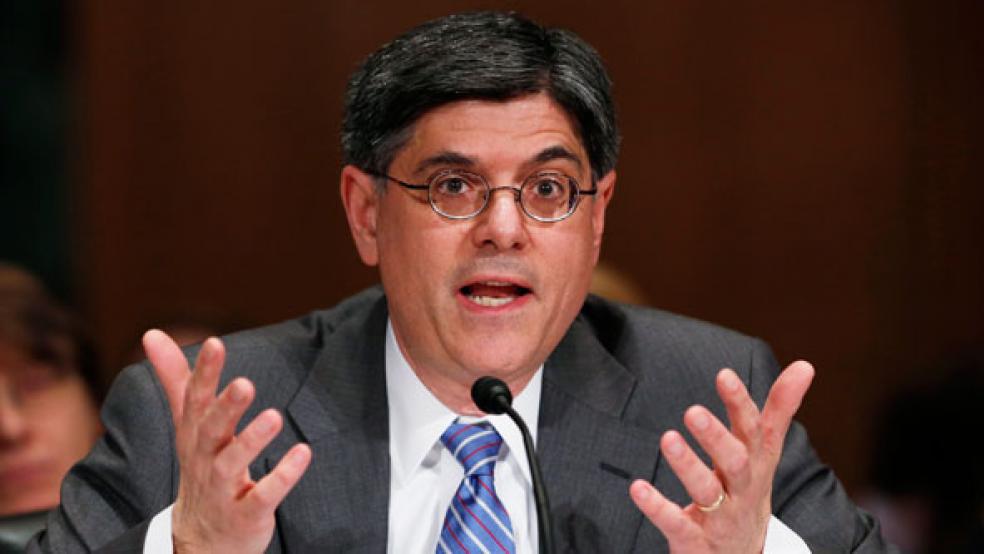Jack Lew, the Treasury Secretary nominee, breezed through his Senate Finance Committee confirmation hearing this morning.
As President Obama’s former chief of staff and budget director in addition to years as a top Capitol Hill aide, Lew knew exactly how to charm the senators who were supposed to interrogate him: Be as deferential and boring as possible.
“I pledge that if confirmed, I will maintain frequent consultation with members of this committee in accordance with the spirit of respect and understanding that has been this committee’s hallmark,” Lew said.
The red hot debates about tax reform and budget deficits was noticeably cooled as he spoke Wednesday. Lew held firm to Obama’s argument that deficit reduction should come from a mix of tax increases and spending cuts, yet he never sounded disagreeable to hashing out differences with Republicans.

“Even as we move forward with deficit reduction, we need to make sure we leaving sufficient room for critical investments in education, research and infrastructure that we need for our economy to grow and compete globally,” said Lew, channeling the State of the Union Address his boss delivered Tuesday night.
Lew, 57, framed the issues like a seasoned technocrat. When Sen. John Thune, R-S.D., tried to score points by noting that the administration’s corporate tax reform framework was just 25 pages long and a past effort was a backbreaking 1,300 pages, Lew easily deflected him by noting he still had copies in his office of the earlier, failed attempts.
Lew sympathized with using corporate and individual tax reform to simultaneously broaden the tax base and lower rates—a GOP pet project—yet acknowledged the difficulty of forcing taxpayers to give up long standing deductions and loopholes such as mortgage deductions.
“On the individual side, it’s a very hard thing to do, to broaden the base, because it’s taking a bunch of things that are very much part of the fabric of how people live right now,” he said.
Unable to skewer Lew on policy, Republican lawmakers turned to the period when Lew—who also ran the Office of Management and Budget for President Bill Clinton—left government service.
From 2001 to 2008, he decamped to his native New York City where his private sector gigs involved the kinds of offshore tax havens that Obama condemned during the 2012 campaign.
But the promise of a tough showdown never materialized as Lew made the facts of the case as unexciting and vague as possible.
After a management stint at New York University, Lew joined Citigroup in 2006 and eventually became the head of operations for its alternative investments unit. The plum Wall Street job included as part of the compensation package a $56,000 investment in a fund based in the Cayman Islands. Citigroup later received $45 billion in taxpayer support in one of the largest government bailouts during the 2008 financial crisis.
“Some of the units’ activities included proprietary trading along with sales and marketing of risky investments,” said Sen. Orrin Hatch of Utah, the ranking Republican on the committee. “If you knew about the marketing and sales of those investments, it would be instructive for us to find out what you knew. If you did not know much about them, then it would be instructive for us to find out why, and to determine exactly what your responsibilities were during your years at Citi when you were very well compensated, including times when Citigroup was being propped up by American taxpayers.”
Hatch at one point suggested that his well-paying job at Citi was known on Wall Street as a “political trophy,” and demanded to know what Lew did at Citi in 2008 that merited a base salary of $350,000 and a bonus of nearly $1 million.
“Sen. Hatch, the work I did in 2008 was running as I said earlier the business of the business, in a year when the financial products of that part of the firm were not doing very well,” Lew responded, adding that he did not have access to records about the riskiest derivatives investments.
Nor, Lew said, did he even know that the Cayman Islands investment was based in that Caribbean territory. He claimed to only have the understanding that the fund was based out of London. And most importantly, he unloaded the investment at a loss when he returned to the government in 2009.
“The experience I had in the private sector has given me perspective that I think enhances my ability to perform, in the role I’m nominated for and in the roles I’ve had,” Lew said. “As far as my 2008 compensation goes, I do believe that it was comparable to compensation for people with positions like mine in the industry.”
Sen. Charles Grassley, R-Iowa, shifted the line of attack to the use of a Cayman Islands-based fund by New York University when Lew was its executive vice president for operations.
“Senator, when I was at NYU I was not aware of the investments that you describe,” Lew said.
A flabbergasted Grassley retorted: “You were paid to know what was going on, and I’m surprised you didn’t know what was going on.”
By the time the second round of questioning started in the afternoon, even Hatch felt obliged to compliment Lew.
“Frankly,” the Utah Republican said, “I think you’ve done really well today.”





